FIREFOX USERS CAN HELP SET A WORLD RECORD
** NOTE: Please wait until the release time to download: 10 AM LA, 1PM New York, 6PM London, 7PM Paris **

What do browsers have to do with decision making? They are an excellent illustration of the power of defaults. The default home page within a browser is kept by vast numbers of users. The operating system’s default browser has, historically, has been adopted by most people. For this reason, the default browser and its settings exert an enormous influence over Web traffic, which translates rather directly into advertising revenue. And we’re not talking peanuts: Google earned $20 billion last year.
However, when a browser gets really good, it can overcome the odds and achieve widespread usage despite not being the default. FireFox is such a browser and for this reason is the official browser of Decision Science News.
Today, June 17th, 2008, marks the historic release of FireFox version 3. It can be downloaded for from the link at the bottom of this post. The source code is also free, if you’re a nerd and would like to modify it to suit your needs.
The good people at Mozilla are trying to set the world record for the most software downloads in a 24 hour period. If you like FireFox, today is your chance to help set that record, and download the new FireFox 3 today.
http://www.spreadfirefox.com/en-US/worldrecord/
24th ANNUAL INTERNATIONAL MEETING OF THE BRUNSWIK SOCIETY, NOV 13-14, 2008
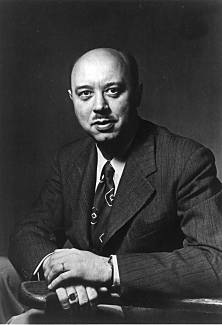
Call for Papers and Participation
Dear friends and colleagues,
The 24th Annual International Meeting of the Brunswik Society will be held on Thursday and Friday, November 13-14, 2008 in Chicago, Illinois, at the Hilton Chicago. The program begins at 12:00 noon on Thursday afternoon, and ends at 6:00 Friday afternoon. We invite papers and/or panel discussion proposals on any theoretical or empirical/applied topic directly related to Egon Brunswik’s philosophy and paradigm. Please send a brief abstract (100 words), and indicate whether the paper/discussion is theoretical or empirical, to Jim Holzworth by Friday, July 18th. Kindly respect this submission due date. The organizing committee is: Jim Holzworth Jim.Holzworth@uconn.edu, Mandeep Dhami mkd25@cam.ac.uk, and Elise Weaver elise_weaver@yahoo.com. The meeting is held concurrently with the Psychonomic Society Annual Meeting and just before the Judgment and Decision Society meeting. More details about the 2008 meeting, including registration instructions, will be posted on the Brunswik Society website, at http://brunswik.org.
TEST YOUR SOCCER PREDICTION SKILLS

Stefan Herzog over in Basel lets us know about a short online study (15 – 20 minutes) on how people predict outcomes in the context of football (soccer). Anybody can participate; this study is explicitly not just for people who are interested or an expert in football.
You can optionally request (a) feedback on your prediction strategy and (b) additional information about this study (once it is completed).
This study is non-commercially oriented, that is, its data is solely used for scientific purposes and is treated confidentially.
Please visit: http://phpserver.psycho.unibas.ch/em2008/
Thank you very much for participating!
Photo credit: http://www.flickr.com/photos/76579169@N00/178821720/
UPDATE
In a bold move, the authors have decided to publish their predictions here on Decision Science News so that nobody can accuse them of changing their model after the matches begin. For further evidence, the results have been archived at The Internet Archive. Here they are:
game group team1 team2 rec1 rec2 recrank1 recrank2 rec_prediction
1 A SUI CZE 0.25 0.26 9 8 CZE
2 A POR TUR 0.41 0.15 3 13 POR
3 B AUT CRO 0.15 0.24 12 10 CRO
4 B GER POL 0.49 0.14 1 14 GER
5 C ROU FRA 0.12 0.4 15 4 FRA
6 C NED ITA 0.35 0.43 5 2 ITA
7 D ESP RUS 0.35 0.12 6 16 ESP
8 D GRE SWE 0.17 0.31 11 7 SWE
9 A CZE POR 0.26 0.41 8 3 POR
10 A SUI TUR 0.25 0.15 9 13 SUI
11 B CRO GER 0.24 0.49 10 1 GER
12 B AUT POL 0.15 0.14 12 14 AUT
13 C ITA ROU 0.43 0.12 2 15 ITA
14 C NED FRA 0.35 0.4 5 4 FRA
15 D SWE ESP 0.31 0.35 7 6 ESP
16 D GRE RUS 0.17 0.12 11 16 GRE
17 A SUI POR 0.25 0.41 9 3 POR
18 A TUR CZE 0.15 0.26 13 8 CZE
19 B POL CRO 0.14 0.24 14 10 CRO
20 B AUT GER 0.15 0.49 12 1 GER
21 C NED ROU 0.35 0.12 5 15 NED
22 C FRA ITA 0.4 0.43 4 2 ITA
23 D GRE ESP 0.17 0.35 11 6 ESP
24 D RUS SWE 0.12 0.31 16 7 SWE
country group rec recrank
GER B 0.492 1
ITA C 0.432 2
POR A 0.409 3
FRA C 0.4 4
NED C 0.354 5
ESP D 0.347 6
SWE D 0.307 7
CZE A 0.26 8
SUI A 0.246 9
CRO B 0.24 10
GRE D 0.167 11
AUT B 0.153 12
TUR A 0.146 13
POL B 0.135 14
ROU C 0.125 15
RUS D 0.116 16
SMDM 2008, OCTOBER 19-22, 2008, PHILADELPHIA
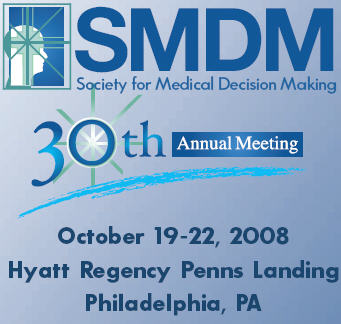
We are pleased to invite you to submit an abstract to the 30th Annual Meeting of the Society for Medical Decision Making, being held in Philadelphia this October. The meeting theme is “Comparative Effectiveness Research.”
Authors of accepted abstracts will be invited to present their work at the SMDM 30th Annual Meeting, October 19 – 22, 2008 in Philadelphia, PA. Accepted abstracts will be published online in Medical Decision Making, SMDM’s peer-reviewed scientific journal.
The deadline for abstract submissions is Friday, June 6, 2008 at 11:59 p.m. EDT. For more information about abstracts or to submit an abstract, go to abstracts. To learn more about the SMDM 30th Annual Meeting, go to meeting. To make hotel reservations for the meeting, go to reservations.
Meeting Co-Chairs:
Sandy Schwartz, MD and Seema Sonnad, PhD
Scientific Review Committee Co-Chairs:
Heather Taffet Gold, PhD, and Lisa Prosser, PhD
BLOOD SUGAR AND HEURISTIC USE

Now this is interesting (*):
ABSTRACT:
This experiment used the attraction effect to test the hypothesis that ingestion of sugar can reduce reliance on intuitive, heuristic-based decision making. In the attraction effect, a difficult choice between two options is swayed by the presence of a seemingly irrelevant “decoy” option. We replicated this effect and the finding that the effect increases when people have depleted their mental resources performing a previous self-control task. Our hypothesis was based on the assumption that effortful processes require and consume relatively large amounts of glucose (brain fuel), and that this use of glucose is why people use heuristic strategies after exerting self-control. Before performing any tasks, some participants drank lemonade sweetened with sugar, which restores blood glucose, whereas others drank lemonade containing a sugar substitute. Only lemonade with sugar reduced the attraction effect. These results show one way in which the body (blood glucose) interacts with the mind (self-control and reliance on heuristics).
REFERENCE:
Masicampo, E. J., & Baumeister, R. F. (2008). Toward a physiology of dual-process reasoning and judgment: Lemonade, willpower, and effortful rule-based analysis. Psychological Science, 19, 255-260.
Download it while it is hot.
(*) When Decision Science News says that “this” is interesting, it means the finding that sugar can affect the particular heuristic employed is interesting.
For a more classically cognitive model of how heuristics are selected from the adaptive toolbox, see:
- Rieskamp, Jörg & Otto, Philipp E. (2006). SSL: A Theory of How People Learn to Select Strategies. Journal of Experimental Psychology: General, 135(2), 207-236.
For a blend of the biological and the cognitive, see:
- Mata, Rui; Schooler, Lael J.; Rieskamp, Jörg (2007). The aging decision maker: Cognitive aging and the adaptive selection of decision strategies. Psychology and Aging, 22(4), 796-810.
Photo credit: http://www.flickr.com/photos/julieivens/491354101/sizes/m/
ANNUAL MEETING OF THE SOCIETY FOR JUDGMENT AND DECISION MAKING

The Society for Judgment and Decision Making (SJDM) invites abstracts for symposia, oral presentations, and posters on any interesting topic related to judgment and decision making. Completed manuscripts are not required.
LOCATION, DATES, AND PROGRAM
SJDM’s annual conference will be held at the Chicago Hilton in Chicago, IL during November 15-17, 2008. Early registration and welcome reception will take place the evening of Friday, November 14. Following the format established in the last few years, the schedule includes a full day on Saturday to make room for more presentations and for two keynote speakers.
SUBMISSIONS
The deadline for submissions is June 15, 2008. Submissions for symposia, oral presentations, and posters should be made through the SJDM website at http://sql.sjdm.org. Technical questions can be addressed to the webmaster, Alan Schwartz, at www at sjdm.org. All other questions can be addressed to the program chair, (also) Alan Schwartz, at alansz at uic.edu.
ELIGIBILITY
At least one author of each presentation must be a member of SJDM. Joining at the time of submission will satisfy this requirement. A membership form may be downloaded from the SJDM website at http://www.sjdm.org. An individual may give only one talk (podium presentation) and present only one poster, but may be a co-author on multiple talks and/or posters.
AWARDS
The Best Student Poster Award is given for the best poster presentation whose first author is a student member of SJDM.
The Hillel Einhorn New Investigator Award is intended to encourage outstanding work by new researchers. Applications are due July 1, 2008. Further details are available at http://www.sjdm.org.
The Jane Beattie Memorial Fund subsidizes travel to North America for a foreign scholar in pursuits related to judgment and decision research, including attendance at the annual SJDM
meeting. Information and an application form can be found at http://faculty.chicagogsb.edu/joshua.klayman/more/BeattieInfo07.htm.
Applications are due by July 16, 2008.
PROGRAM COMMITTEE
Alan Schwartz (Chair), George Wu, Melissa Finucane, Craig McKenzie, Yuval Rottenstreich, Michel Regenwetter, Gal Zauberman, Michael Birnbaum (SJDM president), Julie Downs (Conference Coordinator)
(*) Decision Science News believes deeply in the city of Chicago
Filed in
Jobs ,
SJDM
 Subscribe
Subscribe to Decision Science News by Email (one email per week, easy unsubscribe)
WELL-PAID POSTDOC AT DUKE’S FUQUA SCHOOL
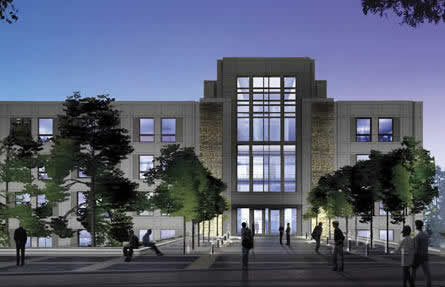
Many great JDMers such as Luce, Bettman, Soll, Larrick, Ariely, Payne, Clemen, Fitzsimons can be found at Duke. Now, so can a lucky postdoc.
Duke University’s Fuqua School of Business invites applications for a two year Postdoctoral Fellowship in the area of Behavioral Decision Making. The postdoctoral fellow will work with Dr. John Payne, Dr. Jim Bettman and Dr. Mary Frances Luce on work related to the impact of emotion on decision making. Planned projects include experimental laboratory research addressing the interaction of different forms and sources of emotion with features of decision task environments.
Opportunities will exist to apply this research within medical and financial domains, depending in part on the interests of the applicant. Applicants should have training in experimental construction, design, and analysis as well as a high-quality, ongoing research stream. The position will provide opportunities to interact with faculty across the business school and allied departments at Duke University. No teaching is required. Salary amount is $50,000; in addition, the post doc will have access to health, dental and retirement benefits. Candidates should submit a CV and selected papers, as well as statements of teaching and research interests, and they should arrange for three letters of recommendation to be sent. Review of applications will begin immediately and will continue until the position is filled.
Candidates are encouraged to have all materials submitted prior to July 1, 2008 to ensure full consideration. If interested, please email CV to mluce at duke.edu.
A TALE OF TWO SELVES
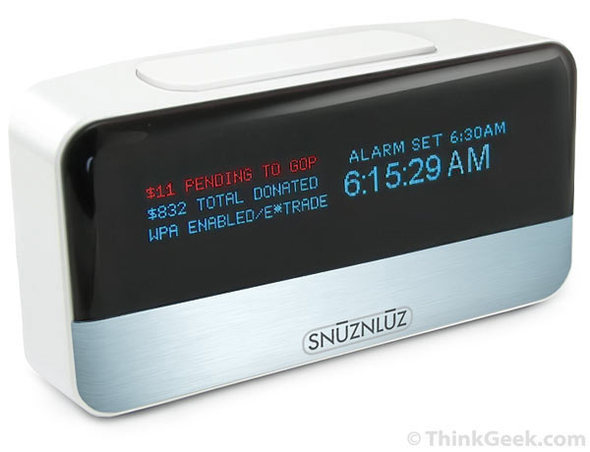
Psychologists and economists love to talk about the notion of two selves: present self and future self. It’s a nice way to explain the tendency to have one preference about the future, but a very different preference when the future becomes the present. On Sunday, future self might want to go to bed early on Thursday, wake up early on Friday, and hit the gym where it will listen to one hour of “Listen-and-repeat Italian” lessons while mastering the StairMaster.
However, come Thursday evening’s dinner with a client, this voice cannot be heard next to that of present self saying yes to dessert, coffee, after-dinner liquer, and a postprandial visit to the pub. Sunday’s voice is also asleep Friday morning, when the present self resets the alarm from 5:30 to 8:00.
In a clever April fools joke, the website www.thinkgeek.com proposed a solution in the form of an alarm clock that donates money to your most-hated cause should you hit the snooze button. Imagine giving money to a despised politician every time you slept in. Might that get you out of bed?
While the SnuzNLuz alarm clock was a joke, it was a brilliant one. I believe that someone will run with this or a very similar idea. Many future selves find their present selves to be their own worst enemies, and might be willing to pay obedience school tuition. In fact, the much-buzzed about www.stickk.com is built on this model: taxing yourself for failing to lose weight, quit smoking, etc.
I am reminded of the time I was a postdoc at Columbia University, on the job market, and deep in a publish-or-perish the phase of my career. I instituted a similar (though lower-tech) mechanism. My rule was that if I didn’t write a certain number of pages each day, I would lose five dollars. I think I lost about $60 on the scheme, though it did land me a job I love.
I remember being seriously conflicted about whom to give the money to if I procrastinated. I felt that if I gave it to a good cause, I would be continually justifying my procrastination as charitable. I felt that if I gave it to a bad cause, that would be evil. I also feared that I would start justifying my procrastination by telling myself the bad cause isn’t so bad. (Sound far-fetched? The idea that we might infer our preferences from our actions is a key, if not field-defining, idea from social psychology.)
In the end, I chose to leave the money on a seat on the New York subway. Maybe a good person would find it, maybe a bad person would find it, all I was certain of was regretting my procrastination. Given that you’re not evil, if you found $5 on the 1/9 train around 2005, I hope that it inched you closer to your goals.
OPTIMAL SHOULDER STANDING

Decision Science News has long been influenced by Phil Greenspun’s observations, such as this one:
Any sufficiently complicated C or Fortran program contains an ad hoc, informally-specified, bug-ridden, slow implementation of half of Common Lisp.
which is known as Greenspun’s Tenth Rule. Trivia buffs will know that there weren’t 9 before it. For those who aren’t programming nerds, this rule contains elements of: don’t reinvent the wheel, use the right tool for the job, and stand on the shoulders of giants, plus a hint of “my favourite programming language is better than yours”.
While doing some research on consumers’ (in)ability to detect differences between products, we came across a 1987 Greenspun & Klotz paper “Audio Analysis VI: Testing Audio Cables”. The authors are engineers who put participants to a single-blind test of sound quality transmitted through high and low quality audio cables. (They found that people can tell two cables apart, but that the expensive cable was preferred only 15 times out of 28.) This seems to be straight-ahead experimental psych, so we were a little surprised when the authors, instead of reporting basic significance tests chose to rederive and compute them from scratch (in Common Lisp, of course) and document the story in a two-page appendix. Perhaps it was the Common Lisp that reminded us of it, but we couldn’t help drop Greenspun a line and ask:
From: Dan Goldstein
Sent: Monday, April 19, 2008
Dear Phil,
[…]
I wonder if you violated the spirit of your 10th law in your 1987 Computer Music Journal article by coding, and describing in a two-page appendix, what could have been replaced by reporting a simple significance test. Such tests are pre-coded in every stats package and in the back of every stats book. This is not a criticism, I’m just wondering why you went to all the trouble.
We were amazed and delighted to get a reply:
From: Philip Greenspun
Sent: Monday, April 21, 2008
Several issues…
1) most of the readers are not stats experts
2) stats books are virtually impossible to understand (I tried a bunch
and gave up, even though I was an undergrad math major!)
3) I was able to explain what I was doing using simple probability
laws that most of the readers would have understood, sharing some
insights from Al Drake, a great probability teacher in the MIT EECS
department
So many people use stats tests and don’t understand them.
We see where Phil is coming from, but wonder if he isn’t being a bit hard on statistics.
INTERVIEW WITH BRUNO FREY, PART II
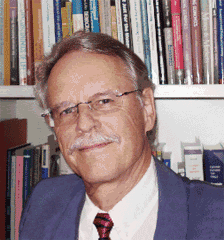
Here we continue last week’s Bruno Frey interview that Lionel Page and Dan Goldstein conducted before Frey’s Economics of Behaviour and Decision Making presentation at London Business School.
Lionel Page – I was thinking of what you said before about the negative effect of the Nobel prize. What do you think is the effect of tenure? I was wondering if there is maybe a negative of tenure. Is there evidence of this kind of thing?
Bruno Frey – I rather like this long period in which one learns the trade of one’s profession. One is socialized to the profession and then one gets tenure. In principle, I would argue that this should be the end of evaluations. Unfortunately, this is no longer true. I am fighting against evaluations. I think when people are well trained, afterwards one should leave them and tell them “ok, go ahead and work”. You would have a larger variance (you would have some that wouldn’t work any more, I perfectly admit that) but the others are then free to do what they like and can do long-run and different things. If you look at my research topics, where would I get approval? What group of economists would approve when I say I want to work on World Heritage? They say, he is crazy. When I say I want to work on awards or on orders, they would say “oh that’s crazy”. On happiness, “crazy, happiness doesn’t exist” etc., etc. I say one must give things a little bit of time to develop.
Dan Goldstein – Is it fair to say your productivity has much to do with the fact that you’re investigating pretty much just whatever it is you want to investigate?
BF – I am still one of those professors who is totally free to do what he wants. I do not have to get funds to do research. I am paid as a professor. I have some co-workers with whom I do the research, but I can decide on my own. Of course with my young collaborators, if they were are not interested, it wouldn’t work at all, but I don’t have to attract funds from outside and try to explain myself. How can I explain, in a new field, what will come out?
DG – Of course, where incentives are concerned, you have the freedom to do nothing if you want …
BF – Yes, but I believe in intrinsic motivation, that essentially good scientists, good scholars are intrinsically motivated. They will work because they like to work.
I couldn’t get interested in a lot of subjects that economists do, especially when I know it’s more or less dry and irrelevant. You know, I just wouldn’t like to work on general equilibrium analysis. And I am probably very bad at it. So, I always try to find new topics. Afterwards, the Americans come with their brilliant educations and the English with their brilliant educations, and of course are better. Or let’s say they are certainly better trained to do the things. So, I have to try to be a little bit original.
 Subscribe to Decision Science News by Email (one email per week, easy unsubscribe)
Subscribe to Decision Science News by Email (one email per week, easy unsubscribe)











